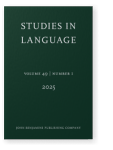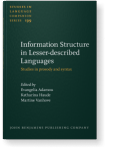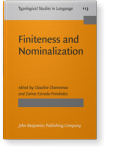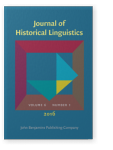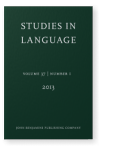Enrique L. Palancar
List of John Benjamins publications for which Enrique L. Palancar plays a role.
2025 Inflection class interactions and valency changes in Matlatzinca Studies in Language 49:1, pp. 1–43 | Article
In this paper, we explore how changes in the inflection class membership of verbs in Matlatzinca (Oto-Pamean, Oto-Manguean, Mexico) lead to changes in both their valency and meaning. In Matlatzinca, verbs often exhibit multiple class membership so that a given verb may be inflected as transitive… read more
2018 Chapter 9. Subjects and focus in clefts: The case of Tilapa Otomi Information Structure in Lesser-described Languages: Studies in prosody and syntax, Adamou, Evangelia, Katharina Haude and Martine Vanhove (eds.), pp. 245–264 | Chapter
This paper is an exploration of the syntax-pragmatics interface in the pseudo-clefts of Tilapa Otomi, an Oto-Manguean language of Mexico. The goal of this paper is to show that the focus phrase in the clefts of Tilapa Otomi is the subject of the cleft construction, which is entirely based on the… read more
2016 On the tightrope between infinitives and action nouns: The case of Otomi nominalizations Finiteness and Nominalization, Chamoreau, Claudine and Zarina Estrada-Fernández (eds.), pp. 141–170 | Article
In this paper, I study the distribution of two nominalization structures in two closely related Amerindian languages of Mexico (Eastern Otomi and Northern Otomi). The structures involve intransitive nominalizations depicting a customary activity performed by humans (‘hunting’, ‘sowing’, etc.) as… read more
2013 The evolution of number in Otomi: The many faces of the dual Studies in Language 37:1, pp. 94–142 | Article
Otomi (Oto-Pamean, Oto-Manguean) is a small group of languages spoken in Mexico which has emerged as a linguistic family in recent times. In this paper, I study relevant changes in the number system of the Otomi languages. These changes constitute an interesting object of study to gain a better… read more
